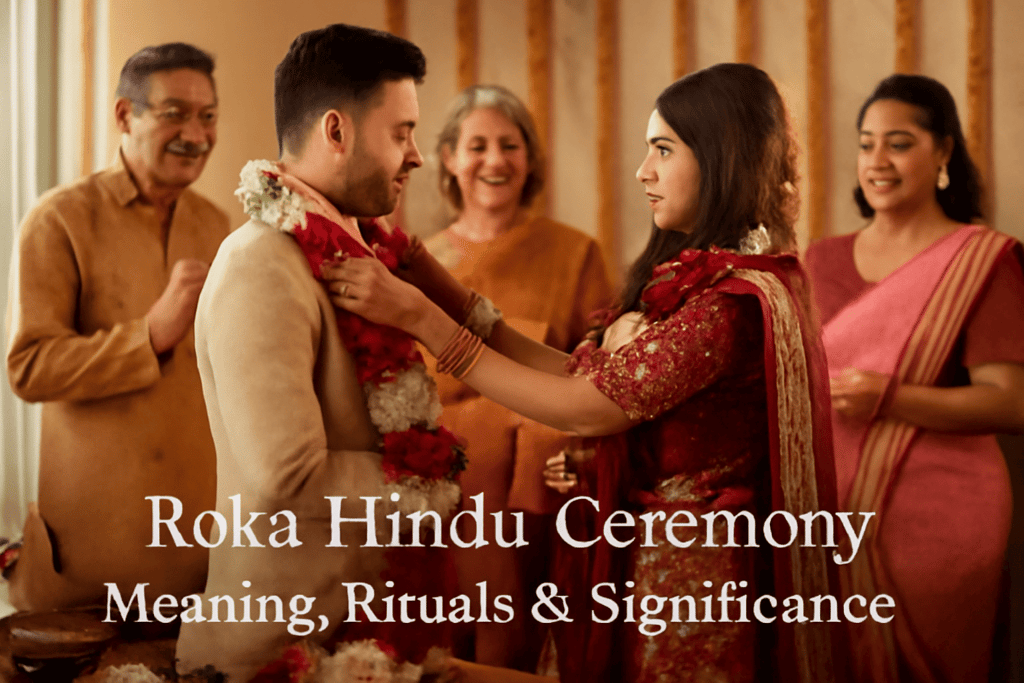Roka Hindu Ceremony: Meaning, Rituals & Significance


Introduction to the Roka Ceremony
The First Step in a Sacred Union
In Hindu weddings, the Roka marks the very beginning of a lifelong journey. It is the ceremony where two families formally consent to unite, sealing the promise of marriage with blessings and goodwill.
Why Roka is Considered a Milestone
Roka is not merely symbolic—it is a declaration of intent. It transforms courtship into commitment, making the bond official within the eyes of society and the blessings of tradition.
Historical Roots of the Roka Ceremony
Cultural Context in Ancient Traditions
The concept of Roka finds its essence in ancient customs where families would come together to agree upon alliances. In those times, the ritual safeguarded harmony and preserved lineage.
Evolution of Roka Across Generations
With changing times, Roka has become less about formal alliances and more about joy. While it retains its roots, the ceremony now embraces modern celebrations alongside traditional reverence.
Meaning of Roka in Hindu Weddings
Symbolism of the Ritual
The term “Roka” translates to stopping or halting. Spiritually, it symbolizes that the search for a life partner has concluded, and destiny has chosen the path forward.
Spiritual and Social Importance
Beyond the couple, Roka binds two families into a sacred relationship. It sets the stage for mutual respect, collaboration, and unity before marriage preparations begin.
Pre-Roka Preparations
Consultation with Families and Priests
Families consult elders and sometimes priests to ensure compatibility of values, traditions, and astrological alignment.
Selection of an Auspicious Date
An auspicious day, determined by astrologers, enhances blessings. This date is chosen carefully to ensure prosperity for the couple.
The Roka Rituals
Exchange of Gifts and Blessings
Gifts such as clothes, jewelry, and sweets are exchanged as tokens of goodwill. Elders shower blessings on the couple, affirming their union.
Application of Tilak and Ritual Offerings
The groom’s forehead is adorned with tilak by the bride’s family, signifying honor, respect, and acceptance. Offerings to deities are also made to sanctify the occasion.
Significance of the Roka Rituals
Union of Two Families Beyond the Couple
Roka represents the merging of households. It is not just about two individuals but about weaving together traditions, cultures, and relationships.
Marking the Beginning of Commitment
After Roka, both families consider the bride and groom as bound. Preparations for the wedding begin in earnest, with this ritual acting as the official announcement.
Traditional Customs During Roka
Clothing and Attire for the Ceremony
The bride and groom often wear traditional outfits—vibrant sarees, lehengas, or sherwanis—that reflect festivity and cultural pride.
Food, Feasting, and Sweet Offerings
Lavish spreads are prepared, with mithai being central to the celebration. Sweets symbolize the joyous journey that lies ahead.
Role of Elders in the Ceremony
Blessings from Parents and Grandparents
Elders play an indispensable role, as their blessings form the spiritual foundation of the union.
Involvement of Extended Family Members
Uncles, aunts, and cousins actively participate, ensuring the event feels communal and celebratory.
Regional Variations of Roka
North Indian Interpretations
In North India, Roka is often a grand affair, accompanied by rituals, songs, and exchange of extravagant gifts.
Punjabi Customs and Celebrations
Punjabis celebrate Roka with unparalleled vigor—music, bhangra, and exuberance fill the air. The ceremony often doubles as a mini-festival.
Adaptations in Urban and South Indian Families
In South India and urban spaces, Roka may be smaller and more intimate, yet equally meaningful.
Emotional Essence of Roka
Strengthening Family Bonds
The ceremony reaffirms unity, as families embrace each other with warmth and shared responsibility.
Joy, Anticipation, and Sentimental Value
For the couple, it is a moment of excitement and deep emotion—the official recognition of their upcoming life together.
Modern-Day Adaptations of Roka
Destination Roka Celebrations
Many families now host Roka ceremonies at picturesque destinations, blending rituals with grandeur.
Simplified Versions in Contemporary Families
Some prefer intimate gatherings at home, keeping the rituals simple while preserving the essence of the tradition.
Roka vs. Engagement Ceremony
Key Differences in Rituals and Significance
Roka is the initial seal of approval, while engagement is more elaborate, often involving ring exchanges and larger gatherings.
How Roka Precedes Engagement in Sequence
The Roka lays the foundation. Engagement follows later, building upon the initial commitment.
Astrological Role in Roka
Determining Compatibility Before Rituals
Horoscope matching is often done before Roka to ensure astrological compatibility. This gives the ritual a sense of spiritual assurance.
Choosing Muhurat for Prosperity
The timing of the ritual is determined by planetary alignments, believed to invite prosperity and happiness into the union.
Music and Festivities During Roka
Traditional Songs and Dance
Families sing folk songs and perform dances, enriching the celebration with heritage.
Modern Musical Additions
Contemporary families often include DJs or live bands, blending the old with the new.
Challenges in Preserving Roka
Urban Lifestyles and Time Constraints
Fast-paced lifestyles sometimes reduce the grandeur of Roka. Families adapt by hosting shorter, more practical versions.
Generational Views on Formalities
Younger generations may view Roka as optional, but many still uphold it to honor tradition.
Global Celebrations of Roka
How Indian Diaspora Observes Roka Abroad
In countries far from India, Roka is celebrated with the same fervor, often adjusted to local contexts.
Fusion of Tradition with Global Culture
Many families abroad blend Roka with multicultural elements, making it a unique celebration of identity.
Conclusion
The Timeless Relevance of Roka
Roka continues to serve as a sacred beginning—an affirmation of intent and harmony that transcends eras.
Why This Ritual Endures Across Centuries
Its strength lies in its simplicity. Rooted in emotion, respect, and tradition, the Roka ceremony remains timeless, binding not just two people but two families in the promise of a shared future.
How can Invitoon enhance your Roka ceremony invitations
Invitoon offers beautifully designed, digital invites that perfectly capture the tradition and joy of your Roka ceremony, making your special announcement elegant and memorable.
Connect
Explore our customizable digital invitations today!
invitoon.store@gmail.com
+91 9243781585
© 2025. All rights reserved. Invitoon
